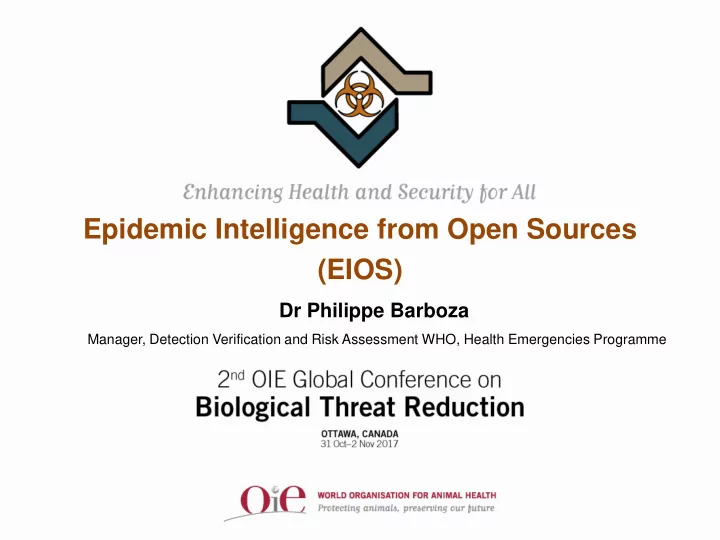

Epidemic Intelligence from Open Sources (EIOS) Dr Philippe Barboza Manager, Detection Verification and Risk Assessment WHO, Health Emergencies Programme
WHO – Health Emergency programme WHE Detect Respond Recover Prepare Prevent May 2016 – WHO Health Emergencies Programme (WHE) Fundamental changes, among other Detection of public health crises at centre of WHO activities Single approach across 3 WHO levels Health emergency information & risk assessment departments HEALTH EMERGENCIES 2 programme
Improving global epidemic intelligence - Comprehensive - Bring initiatives together - Expand input: input - Volume of sources - Variety of sources respond process - Velocity of sources - Improve assessment epidemic Dissem- detect - Accessible intelligence inate - Global, national and local use - Build capacity assess verify - Collaborative analyse - Bring people together - Facilitate communication - Form expert communities HEALTH EMERGENCIES 3 programme
WHO & Epidemic Intelligence milestones Coll Collabo borati tion on WHO WHO - Cana Canada da t to de o develop elop GPHIN GPHI N (Global Public Health Intelligence Network) Gl Glob obal H al Hea ealt lth h Se Secu curi rity I ty Initi nitiati tive e en endo dorse ses s EAR EAR ( Early Alerting and Reporting platform) WHO WHO – Eu Europ opea ean n Commission Commission de develop elop HD HDRA RAS S (Hazard Detection and Risk Assessment System) HEALTH EMERGENCIES 4 programme
Evidence based : need supra-system for a new EI initiative “No super-system exists to pool expert systems' expertise World Health Emergencies Programme Created and more initiatives must be developed in this direction. ” Prevent, Prepare, Detect, Rapidly Respond and Recover Barboza P, Vaillant L, Mawudeku A, Nelson NP, Hartley DM, Madoff LC, et al. (2013) Evaluation of Epidemic Intelligence Systems Integrated in the Early Alerting and Reporting Project for the Detection of A/H5N1 Influenza Events. PLoS ONE8(3): e57252. https://doi.org/10.1371/journal.pone.0057252 HEALTH EMERGENCIES 5 programme
EIOS conception 90s-2007 2008-2016 2017 EAR (GHSI) EIOS HDRAS Goals 1 st Integrated • Capitalize on existing Phase collaboration • Foster synergies • Pool expertise • Reduce duplication 2 nd Roll out Phase • Increased adaptability HEALTH EMERGENCIES programme
The EIOS Initiative WHO leadership - WHE Mandate Minimise hazards’ impact through improved detection Strengthen global/national/subnational capacities Promote development of Event-Based surveillance Collaborative approach Close collaboration with external EBS expert Enable exchange of expertise, pooling of resources Address needs of a wide array or users Resources, context, needs Domains ( all hazards, zoonosis biological chemical … ) HEALTH EMERGENCIES 7 programme
EIOS technical process Scrape process De-duplicate Tag Categorise Translate Share HEALTH EMERGENCIES 8 programme
EIOS System: output HEALTH EMERGENCIES 9 programme
EIOS System: output HEALTH EMERGENCIES 10 programme
EIOS System: input Browse Rapid Collection Search / Filter Traditional and Social Media Read Government Sources Comment Over 1 million articles /week Secure access Communication within communities Communication across communities Verify open source information user Contribute new information and analysis communication HEALTH EMERGENCIES 11 programme
The EIOS - Zoonosis ~60% existing human infections zoonotic >75% emerging human infections ~80% potential bioterrorist agents (source: OIE; http://www.oie.int/en/for-the-media/onehealth/ ) Animal/plant diseases affect nutrition, health & trade Improved Operational detection model HEALTH EMERGENCIES 12 programme
Next Steps & Target Dates* start end Draft three-year plan and October December documentation 2017 2017 Secure long-term funding ongoing November April Test and evaluate system 2017 2018 May System roll out (new users) ongoing 2018 Collaborative enhancements October ongoing (system evolution) 2018 *contingent on approvals, progress, resources & details to be articulated in three-year plan HEALTH EMERGENCIES 13 programme
The EIOS Initiative: perspective Documentation, Planning, Roadmap, Funding Core EIOS System Testing, Monitoring & Evaluation User Network Expansion and Training Develop & Expand Communication on System World Health Emergencies Programme Created Collaborative Enhancements to System Prevent, Prepare, Detect, Rapidly Respond and Recover 2017 2018 2019 2020 HEALTH EMERGENCIES 14 programme
Thank you Dr Philippe Barboza Manager Detection Verification and Risk Assessment WHO, Health Emergencies Programme
Recommend
More recommend